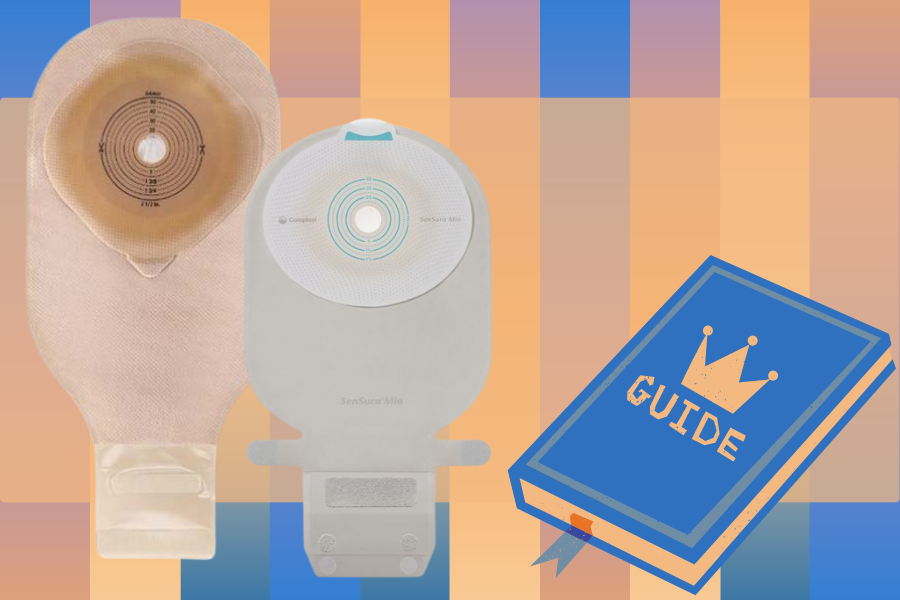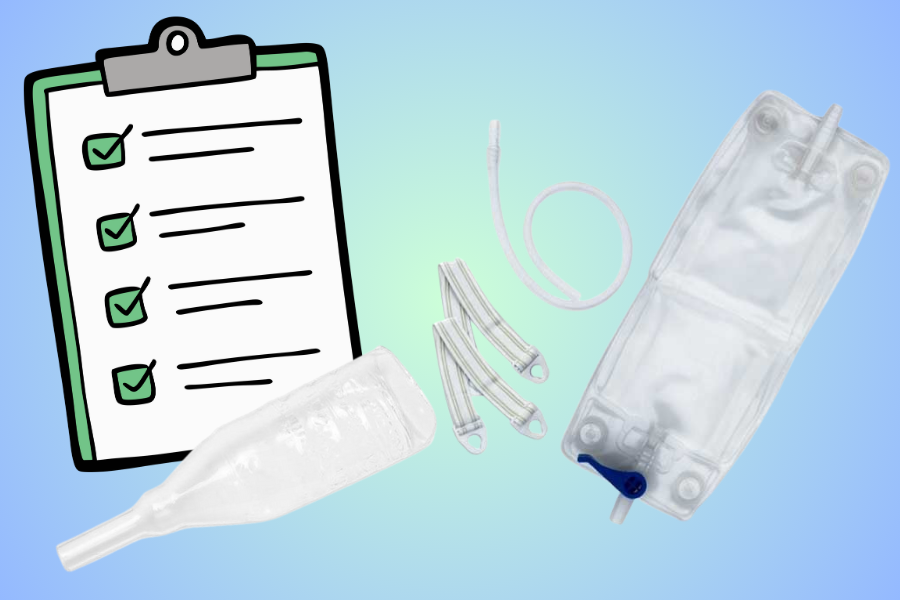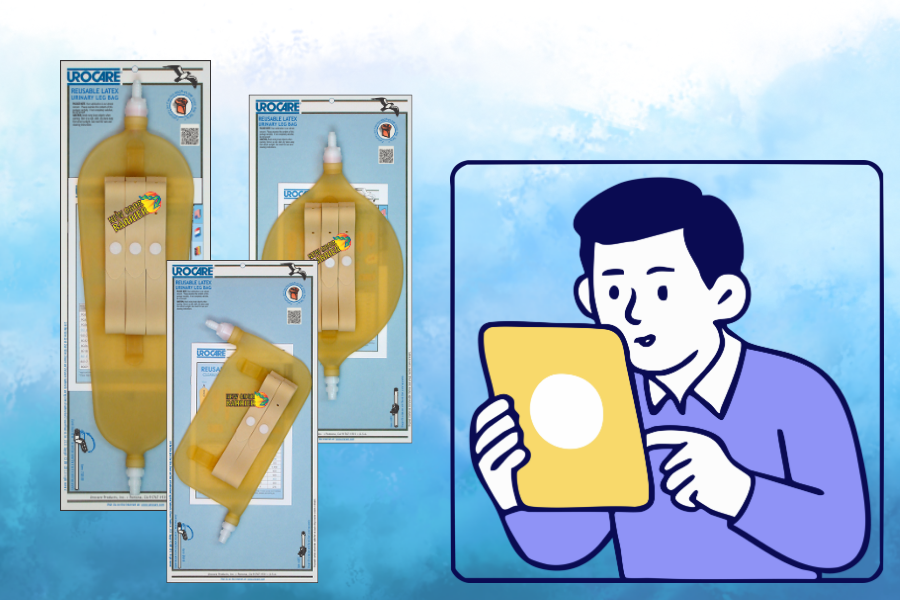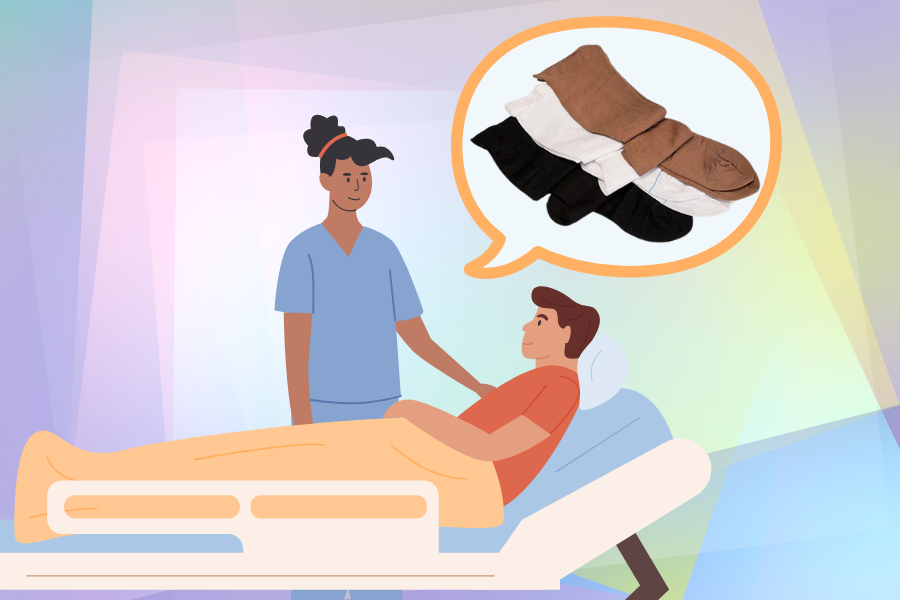Living with a Colostomy Bag
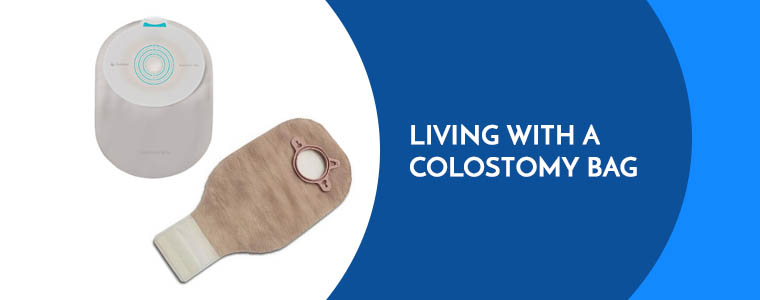
An ostomy is an artificial opening created through surgery that is often required when the individual’s bowel or bladder does not function normally. The surgery allows waste to leave the body through a stoma on the abdominal wall. Ostomies can be temporary or permanent.
Depending on the body part they are affixed to, ostomies can be divided into three main types – urostomy, ileostomy, and colostomy. With a colostomy, part of the large intestine and/or colon is removed during a surgical procedure.
Colostomy Bags and Supplies
Colostomy bags are small bags that collect bodily waste passed through the stoma.
In individuals with a colostomy, the stool is primarily firm, which is why a closed pouch is a good choice for many. In some cases, the stoma output may be a more liquid form, making a drainable ostomy pouches a preferable option.
There are many colostomy bag care accessories and supplies designed to make you feel secure and comfortable. These often include pouch support accessories, odor-eliminating products, and skin protecting products.
![]()
Colostomy and Lifestyle Changes
Returning to your daily life after a colostomy surgery is a worrisome experience for many. Modern colostomy bag supplies and accessories, however, are very secure and discreet, so you can still do most of the activities you enjoyed before your colostomy surgery.
Ostomy bags often go undetected and most people will never that you have one unless you tell them. You should be able to wear the same clothes you wore before the surgery, as ostomy bags are generally designed to lie flat against the abdomen. If you don’t feel comfortable enough – or need some extra support – you can always opt for an ostomy belt.
If you are struggling to adjust and manage your stoma during your daily routine, talk to your doctor or nurse about the concerns you have.
Traveling with a Colostomy Bag
After colostomy surgery, people can travel as they usually would. Some planning, though, is suggested.
Before setting off, try to estimate the number of appliance changes you’ll need while you’re away, as well as all of the ostomy supplies (e.g., belts, barrier rings, wipes). Make sure to pack extra supplies and be aware of your food intake. Be careful when putting on seat belts, as they may cross the area where your stoma is located.
When flying, pack your colostomy bag supplies both in your checked and carry-on luggage. Ensure that you are prepared to manage your colostomy bagduring the flight, or in the event your luggage gets lost. If you have concerns about airport screening, contact the Transportation Security Administration (TSA), which can provide extra information and assistance to travelers with disabilities and medical conditions.
Going Back to Work
Going back to work with a colostomy bag is generally not a challenge, but depending on your recovery, it may take several months before you are ready to return.
Speak with your employer about building your working hours gradually. You may also need to inform your employer that you won’t be able to lift heavy items for a while, or that you may need more frequent bathroom breaks to manage your colostomy. Unless you want to, you don’t have to tell your colleagues about your ostomy.
Odor Management with a Colostomy
For many “colostomates”, emitting smells that other people notice is a huge worry. Odors can be managed by limiting the intake of odor-causing foods and using special products that eliminate smells.
Both solid and liquid products are available to help reduce any smells that may come from your ostomy pouch. Odor eliminating products can either be taken orally or placed directly into the ostomy pouch.
Room odor eliminators are safe to use at home. Air fresheners can be used as well, although they mask the smell rather than eliminating it.
Colostomy and Diet Changes
Along with the physical care of the colostomy, you may need to make dietary changes as well. During the first weeks following your colostomy surgery, your doctor or nurse may recommend a low-fiber diet to avoid bowel blockages. As your body recovers, you can start getting back to your normal diet.
Anyone with an colostomy bag should be aware of the different types of food that cause gas. Such foods include beans, cabbage, carbonated drinks, onions, bananas, carrots, broccoli, and dairy products. Other odor-producing foods include fish, eggs, and brussels sprouts.
With a colostomy, stool can pass at any time. Keep track of your bowel movements as constipation can be a problem. To prevent constipation, drink plenty of fluids and increase your daily intakes of fruits and vegetables.
Intimacy and Sex
A colostomy bag does not get in the way of most physical activities, including sexual intercourse. It’s sensible, however, to try and avoid positions that place weight on the stoma.
In some men, a colostomy may affect blood supply to the penis, causing erectile dysfunction. Erectile dysfunction treatments, such as Viagra, can help increase the blood supply and maintain an erection.
Note: Consult your treating physician for the best course of treatment for erectile dysfunction.
A colostomy bag may affect self-confidence and impact a person’s sex life, and it may take several months to rebuild confidence. Discuss any concerns you have with a partner: It’s likely that they will also be nervous about being intimate or hurting your stoma. In most cases, sexual activity will not affect the stoma or loosen the pouch.
If you’re not yet comfortable with the appearance of your colostomy system, you can easily cover it with a support belt or special ostomy underwear. Changing your appliances or using a small stoma cap (if possible) before being intimate may help you feel more confident.
Sports and Swimming with a Colostomy Bag
It’s important to give your abdominal muscles time to heal. To help recovery, mild exercises are suggested. Heavy lifting is not recommended for at least three months after colostomy surgery.
Colostomy bags are waterproof, meaning that you can swim with the pouching system. It is normal to have concerns about water loosening the system or causing it to fall off, but remember: The adhesive on your colostomy bag remains effective, even in water.
When there is a certain predictability to stoma function, you may opt for a smaller stoma cap or a mini-pouch during swimming and other physical activities. Colostomy bag belts provide extra security while participating in exercise. If you plan on engaging in contact sports, consider a stoma guard to protect it from potential trauma.
Colostomy and Pregnancy
Having a colostomy does not usually affect fertility, pregnancy, or having a natural birth. Most women do not experience any serious ostomy complications before or after pregnancy.
During pregnancy, as the abdomen expands, some women may experience mild complications. These include restricted stoma output and changes in the shape and size of the stoma. Most stomas revert back to normal size after birth. Alternate products – such as a different type of bag or flange – may be required to avoid complications like lacerations to the stoma and skin irritation.
In later pregnancy stages, women with colostomies may experience constipation. If this becomes problematic, schedule an appointment with your treating physician to determine a safe medication.
After delivery, complications such as parastomal hernia and abnormal lengthening of the stoma may occur. An enterostomal therapist (ET) can assess the symptoms and, if required, refer you for further treatment.
If you plan on becoming pregnant shortly after your colostomy surgery, discuss this with your physician. It may be necessary to have additional examinations to ensure your body has fully recovered.
Coping with the Changes
Living with a colostomy bag is a physical and emotional change for many. As body functions are often a private topic, people might not feel comfortable talking about them openly. It’s important to remember that many people live with an ostomy.
You can consult your nurse to learn more about about resources and support groups in your local community which can help you adjust to the changes in your life.
Knowing what to expect – and how to deal with it – is essential for adjusting and leading a full and active life.
Visit our ostomy blog section for more comprehensive ostomy information and tips!


